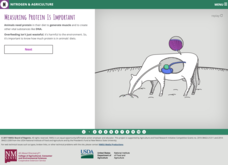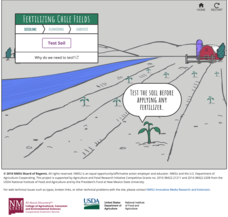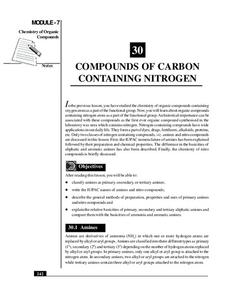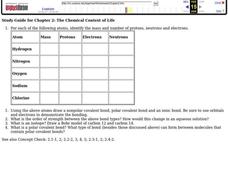Kenan Fellows
Sustainability: Learning for a Lifetime – Soil
Do great gardeners really have green thumbs—or just really great soil? Environmental scholars discover what makes Earth's soil and soil quality so important through research and experimentation. Learners also develop an understanding of...
Concord Consortium
Polarization
This is one cool resource for teaching about polarity! Chemistry scholars observe electron distribution and molecular shape as they select different non-metals and form bonds. The interactive offers two views, surface charge and electron...
Learning Games Lab
Nitrogen in Pollutants
Responsible farming is important for maintaining natural resources. Eager scientists complete a WebQuest to explore what happens to nitrogen when it enters the soil. They learn about the chemical makeup of nitrogen-based molecules...
Learning Games Lab
Nitrogen in Fertilizer
Nitrogen is an essential element for productive farming. An interactive lesson explores the chemical makeup of different fertilizers and their corresponding nitrogen content. The interactive challenges individuals to complete...
Learning Games Lab
Nitrogen in Feed
Knowing what farmers are feeding livestock is just smart business. A WebQuest lesson helps learners build an understanding of the relationship between amino acids, nitrogen, and protein. With interactive instruction,...
Learning Games Lab
Cattle Feeding
Finding a balance between too much protein and not enough doesn't have to be a guessing game. Young scientists use an interactive lesson to learn how to calculate protein content in cattle feed and how to mix feed to create the ideal...
Learning Games Lab
Fertilizing Chile
Fertilizer can mean the difference between a profit and a loss. Scholars use an online interactive to explore the effects of fertilizing in agriculture. Given information about the nitrogen levels in the soil, they decide the fertilizer...
Nuffield Foundation
Nitrogen-Fixing Bacteria in Root Nodules of Leguminous Plants
Fixin' to add a great resource to your plans? Scholars perform an experiment to investigate nitrogen-fixing bacteria from plant roots. Along the way, they learn about the concepts of symbiosis and mutualism.
Royal Society of Chemistry
Organic Molecules Day—Chemistry Outreach
In search of an organic lab that employs real-life techniques and analysis methods? Groups carry out the nitration of methyl benzoate, then attempt to determine the number and location of the nitro groups added to the benzene ring....
Royal Society of Chemistry
Electronegativity Values
Finally, an electronegativity resource your class will be strangely drawn to! Skilled scientists manipulate interactive puzzles to gain an understanding of common electronegativity values. The great thing? You can conduct the lesson...
Concord Consortium
Making Molecules
It's molecule magic! Skillful scholars explore the effects of different atoms on molecular polarization using an intuitive interactive. The resource displays the charge at different locations on the molecule, then adapts as the user...
Concord Consortium
Breaking a Molecular Bond
Breaking up is hard, especially with a third part involved! Watch as molecules of hydrogen, oxygen, and nitrogen try to keep it together as a neutral third atom bombards them. Users control the reactive molecules and the velocity of the...
Teach Engineering
Air Pollution in the Pacific Northwest
Scholars investigate levels of nitrogen dioxide in the Pacific Northwest by examining the role of nitrogen in air pollution and how remote sensing can be used to measure nitrogen levels. An Excel spreadsheet calculates the difference...
National Institute of Open Schooling
p-Block Elements and Their Compounds – I
Lesson 21 in a series of 36 specifically focuses on elements and their compounds from groups 13, 14, and 15 on the periodic table — including boron, carbon, aluminum, silicon, nitrogen, and phosphorus. Classes learn how some of these...
National Institute of Open Schooling
Compounds of Carbon Containing Nitrogen
Amines are vital to humans because they help form amino acids, the building blocks of proteins. The 30th lesson in a series of 36 specifically focuses on the organic compounds that contain nitrogen. Learners classify amines and nitro...
NOAA
The Dead Zone
The fifth installment of a 23-part NOAA Enrichment in Marine sciences and Oceanography (NEMO) program defines dead zones and how they form. Pupils then examine data from the Gulf of Mexico to determine dead zone formation.
Curated OER
Group 15, The Nitrogen Group
This short presentation provides a convenient introduction to the nitrogen group in the periodic table of elements. A graphic displays where they are placed in the periodic table. The nitrogen cycle is mentioned and ammonia is explained....
Curated OER
The Nitrogen Cycle
The nitrogen cycle is the focus of a well-designed science lesson. In it, learners see that plants and animals produce waste products and decompose after death. Many of the waste products include nitrogen which is absobed by other...
Curated OER
Air
This presentation is about air. What makes it unique is that, in addition to simply providing information about the components of air and the action of air pressure, it includes a series of four experiments that bring these...
Curated OER
The Chemical Context of Life
In this chemistry worksheet, students fill in the chart for question one. The chart is filled out examining the mass, protons, electrons, and neutrons for specific atoms.
Curated OER
DNA Cut and Paste Activity
Here is a cut and paste activity worksheet designed for older students. They fill in the blank with information about the composition of DNA, then create a DNA strand with its complimentary nucleotide chain.
Curated OER
Environmental Requirements
All aspects of soil and its components are reviewed here. Your class will learn how certain organisms help the quality of the earth and support growth. Different ways to enhance the chemical make-up are described and will be...
Curated OER
Soil Fertility
Fertility in soil is the topic of this presentation. Future farmers will be able to define fertilizer, list ten essential soil elements, and describe the roles of both primary and secondary nutrients in plant production. Although there...
Curated OER
AP: Chapter 37: Plant Nutrition
Two pages of questions provide a brief overview of plant nutrition. Biology or botany brainiacs describe how plants absorb and transport nutrients, they explain the role of different bacteria, and they describe a variety of unusual...

























